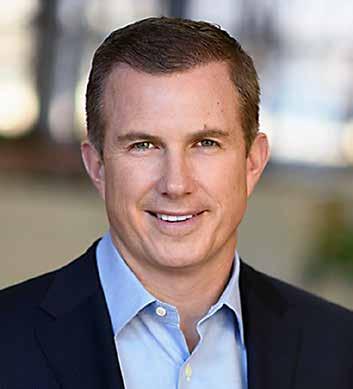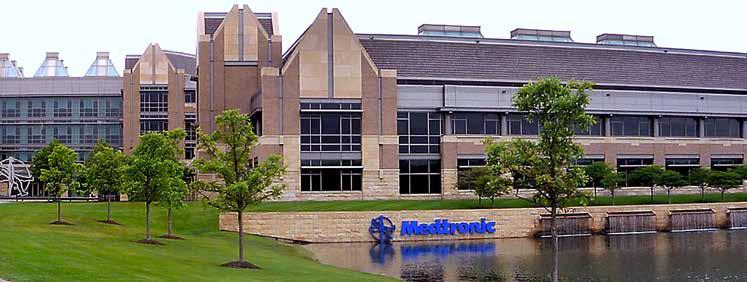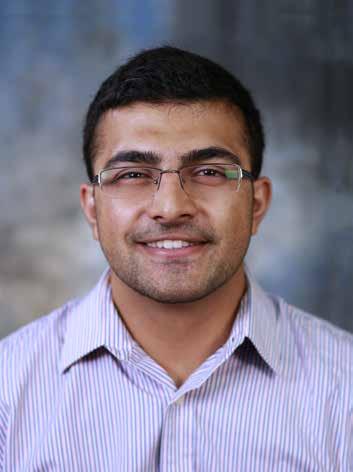
8 minute read
Facts and figures
Scholar alumnus ready for next step as CEO of Medtronic
Geoff Martha is drawn to people who never stop learning.
Advertisement
“When I interview people or I evaluate people, I’m always trying to figure out, are they still learning?” said the Smeal College of Business and University Scholars Program alumnus. “Or are they trying to apply old takes to new scenarios?”
Martha became the chief executive officer of Medtronic, a global health care solutions company, in April. His time at Penn State and in the honors program fed his desire to continuously learn, he said. “I was already pretty motivated to get good grades, but at the end of the day, if that is your motivation — ‘I want to get an ‘A’, I want to get promoted or paid more’ — those type of goals don’t last,” Martha said. “You have to be really interested in something. The Scholars Program helped pique my curiosity in things and helped me become an active learner.”
Martha’s path to Penn State was largely influenced by hockey. He spent his final two years of high school at Culver Military Academy, where he played alongside future NHL and Olympic athletes and prepared for a rigorous academic slate in college. He spent one semester at Colby College in Waterville, Maine before transferring to Penn State midway through his first year.
The University Scholars Program – which would become the Schreyer Honors College — played a key role in Martha’s decision to transfer. He credits his advisers in the Scholars Program and his advisers in Smeal with helping him to map out his academic goals, explore scholarship options, and push himself in and out of the classroom.
After going through GE’s Financial Management Program, Martha worked in various roles with GE Capital for 15 years, then as the managing director for business development for GE Healthcare for nearly five years. He enjoyed the switch to healthcare and moved to Medtronic in 2011. Martha likes that the company seeks solutions to unmet clinical needs, such as a catheter that removes blood clots from the brain and a new therapy that treats uncontrolled hypertension.
“I’m not the one inventing these therapies, but I’m in a role to help facilitate that process. Make the right investments, allocate capital to clear the way and enable our engineers and clinical scientists to invent these things and help our sales force globalize them into new standards of care,” he said. “That type of work is so fulfilling. I’m pinching myself that this is what I do for a living.”

Pattni hopes to use MBA to create social change
Shaan Pattni ’16 Econ and Bus has used data analytics to help clients across private, public, and security sectors improve their decision making in African markets. Along the way, the Scholar alumnus began to think about how he could drive social impact more directly.
To that end, Pattni will spend the next two years in the University of Oxford’s 1+1 MBA program, which will allow him to combine a master’s degree in African studies and an MBA. The African Studies degree will allow him to develop an in-depth knowledge of the social, economic, and political forces driving change on the African continent, where he hopes to continue to create a positive impact. The MBA degree will give him a breadth of knowledge across business functions that can help him scale sustainable technologies.
“For the last four years, I’ve predominately focused on data analytics, and I wanted a business education to augment the technical skill set,” Pattni said. “Most importantly, I wanted to apply it to emerging economies, specifically countries in Africa.”
Pattni was awarded a Pershing Square Scholarship, which covers the full cost of the Oxford 1+1 program and is given annually to five individuals who, according to the university, “can demonstrate the potential and commitment to finding scalable and sustainable solutions to world-scale social challenges.”
His desire to create social change stemmed in part from his experiences with the Humanitarian Engineering and Social Entrepreneurship (HESE) program during his time as a Penn State undergraduate student. His interest shifted from nonprofit work to using technology to create sustainable solutions.
Pattni said he enjoyed the “diversity of people and thought” in the Schreyer Honors College and is grateful for the connections he made with alumni while he was a student.
“They push you and challenge you to think critically about how you see the world and what you want to see,” he said.
After graduating in 2016, he spent two years as a consultant at Bates White. With a strong foundation in data analysis, he moved to Fraym, a Washington, D.C.-based startup that uses localized data to help organizations make data-driven decisions in emerging markets. His project work included informing the NBA’s market entry into African countries with its inaugural Basketball Africa League, and most recently, supporting African governments in their COVID-19 responses.

After Oxford, Pattni hopes to find more opportunities to merge his interests in data, business, and clean energy with a company of his own.
“When you help a lot of clients, you think, ‘Wow, I wish I was the one implementing this,’” he said. “I loved helping them, but what can I contribute directly?”

Her father wanted her to be a lawyer. She wanted to work in politics. But after her path led her thousands of miles from home and into a career she had never even considered, Moradeyo (Deyo) Olorunnisola now helps students find their own paths as admissions director of the Schreyer Honors College.
Deyo was born in the United Kingdom but grew up in Nigeria. Her father, Sanya Dosunmu, was a successful television producer who would later go into politics. When she was 16, she visited New York with her family, as a reward for graduating from high school. Two weeks into the three-week trip, Sanya told Deyo and her sister, Moradeun, they were going to stay in the United States for the next part of their education due to educational and political upheaval in Nigeria.
The siblings enrolled at St. Francis College in Brooklyn, New York, where Deyo studied political science and volunteered as a peer mentor and tutor. It was there that she began to reconsider her career options. Growing up, she had only known a culture in which children decided what they were going to study do at a young age, then stayed on that track with few opportunities to change.
“When I came here and finally realized that people can change their mind, and the educational system was flexible enough to allow you to change, it was fascinating to me,” she said. “It saddens me that there are pockets in this country where that opportunity is not available to people.”
After graduating, Deyo worked as the admissions coordinator in the admissions office of the Weill Cornell Graduate School of Medical Sciences. She came to Penn State in 1995, working in the undergraduate admissions office, then the College of Information Sciences and Technology before joining the Honors College in 2016. The relatively small size of the student population — the Honors College admits approximately 300 first-year Scholars each year — allows her to get to know more of the students on a personal level, both during and after the recruitment process, than she might in other admissions positions.
“If I can help just one student a month discover their fit academically, I’ve done my job,” she said. “Every student that I help find a fit gives me a sense of accomplishment and success.”
Deyo says the hardest part of the job “is that we’re not able to admit more students.” She also believes the major challenge facing Penn State and higher education in general is expanding the pool of applicants to include more underrepresented and underserved students. Recently, the admissions office has been working to help high school students prepare for the essay questions they will see on the application.
“I grew up with tribalism which gives advantages to certain tribes within Nigeria. In that context, as in many places around the world, I know that education is the great equalizer. It is one factor that can change the trajectory of life and elevate people from poverty to the middle class,” she said. “And we don’t just need people to be in the middle class. We need diversity at all levels especially the higher levels of our economy. If I can bring more underrepresented students into this environment, where they can acquire the knowledge, skills and connections that help them soar, it changes the matrix not just for their lives but for their communities.”
In May, Deyo was appointed as one of three Penn State Administrative Fellows for the 2020-21 academic year. Her mentor will be Tracey Huston, vice president for Outreach. She is looking forward to the chance to spend the next year learning more about how decisions are made at higher levels of the institution.
“What don’t I know that I should know that will help make me successful in my job here? What is it about my perspective that I can bring in that situation to help change the thinking and the dynamic and help us to be what we want to be?” she said. “I have an open mind about this experience. This is the next step in my education, as it were.”










